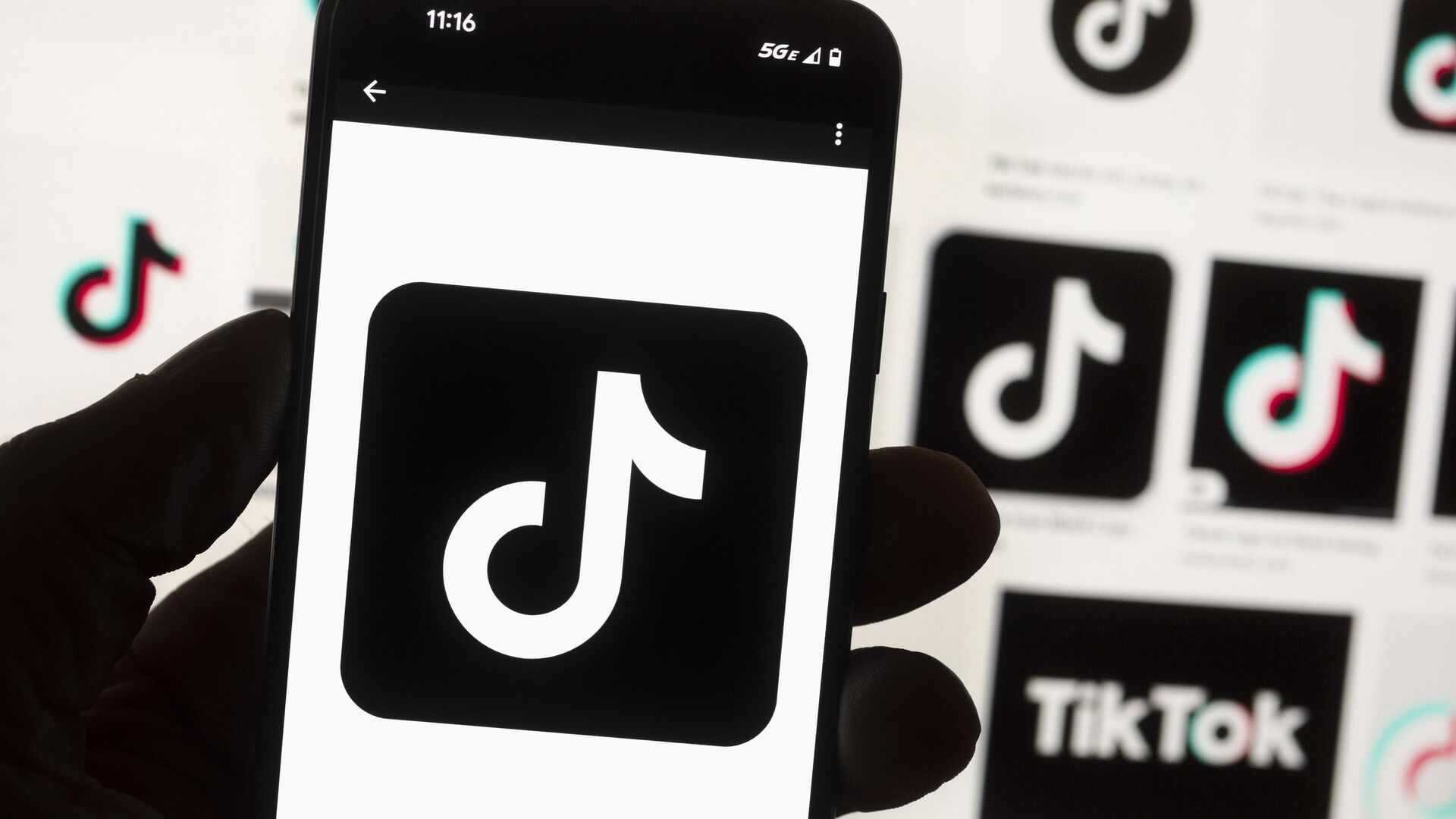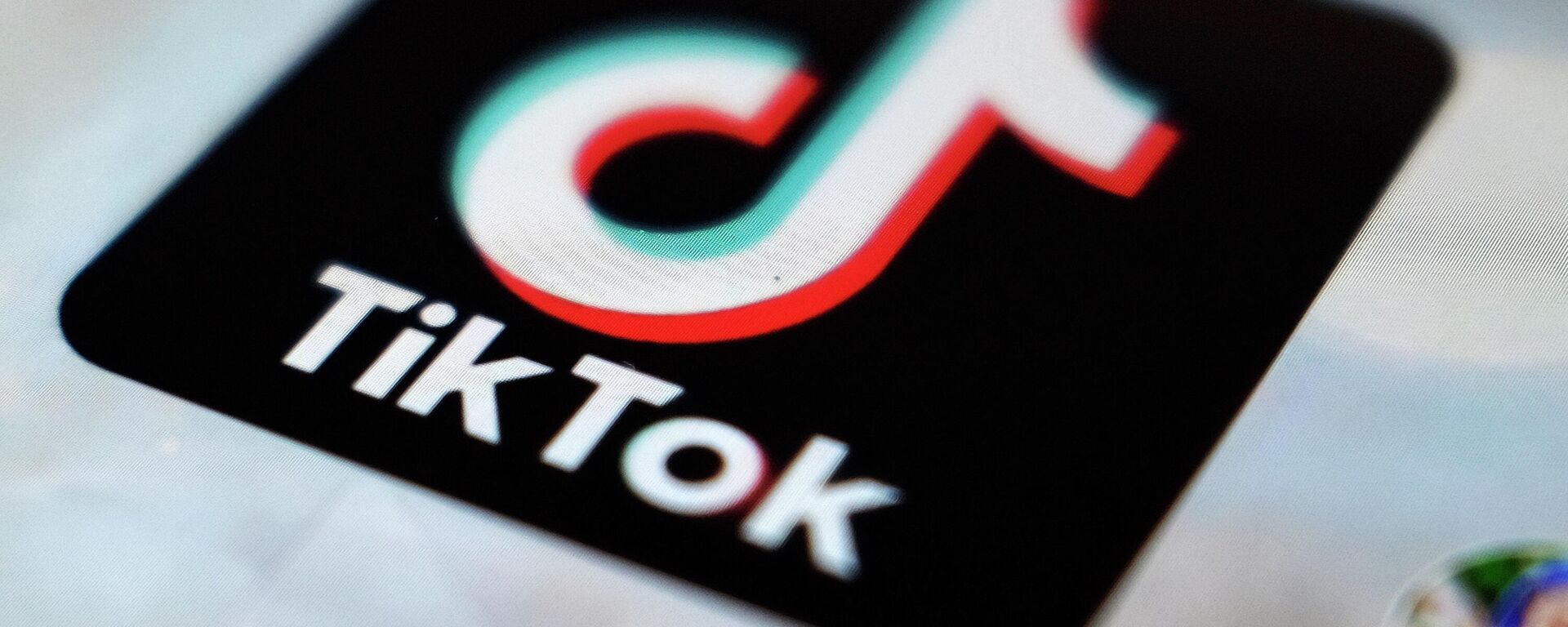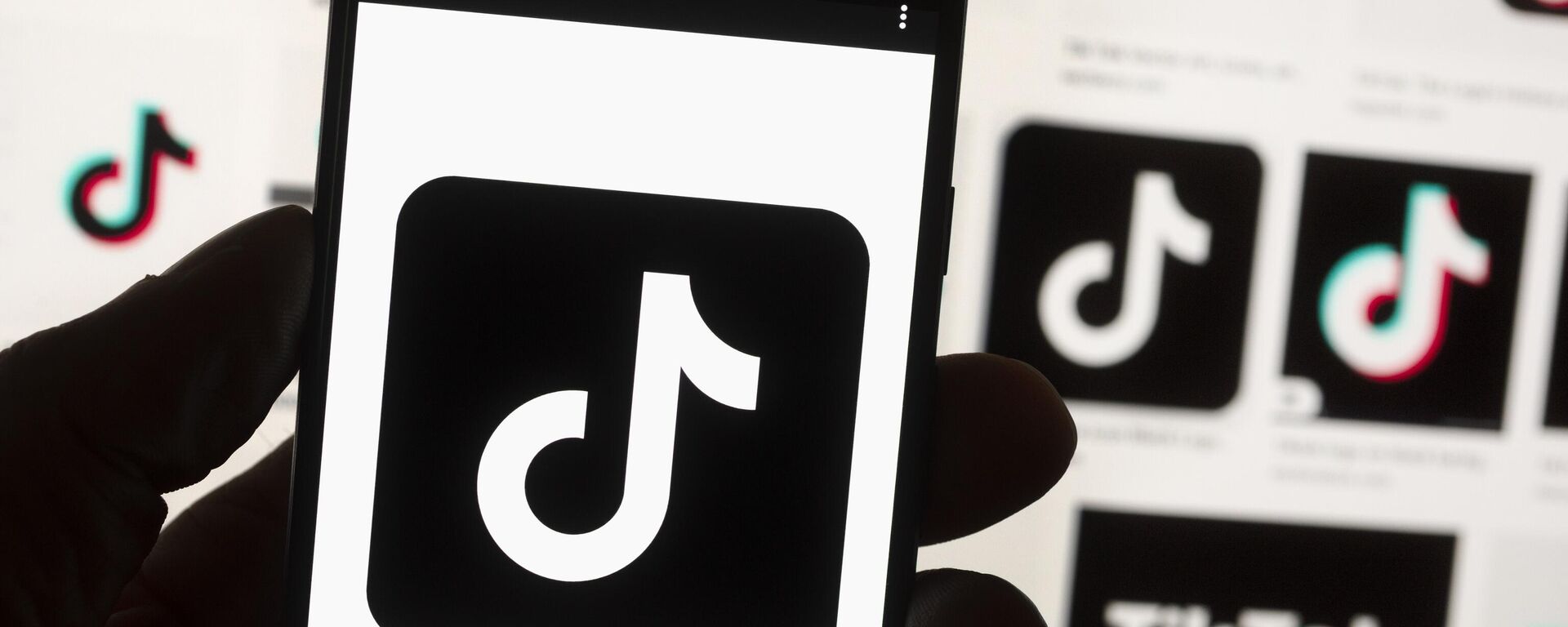https://sputnikglobe.com/20230518/first-ever-state-wide-tiktok-ban-imposed-by-montana-1110431282.html
First-Ever State-Wide TikTok Ban Imposed by Montana
First-Ever State-Wide TikTok Ban Imposed by Montana
Sputnik International
Montana became the first state to completely ban TikTok on Wednesday after Governor Greg Gianforte signed the bill on Wednesday. It is scheduled to take effect January 1, 2024
2023-05-18T03:41+0000
2023-05-18T03:41+0000
2023-05-18T03:36+0000
americas
montana
oracle
tiktok
greg gianforte
internet censorship
ban
china
https://cdn1.img.sputnikglobe.com/img/07e6/0c/08/1105192525_0:160:3073:1888_1920x0_80_0_0_0402ee49ad074a5697ed5f421a3a59b7.jpg
Montana officially became the first state on Wednesday to pass a law completely banning social media app TikTok from the state.Governor Greg Gianforte signed the bill on Wednesday after the legal measure easily passed the state’s GOP-controlled legislature. The ban is scheduled to go into effect on January 1, 2024.The law, SB-419, would fine app stores and TikTok $10,000 anytime a user in the state of Montana is given “the option to download the TikTok mobile application,” and would continue fining them as long as the violation continues.TikTok spokesperson Brooke Oberwetter said the law violates the First Amendment and attempted to ease the concerns of users in Montana. Lawmakers and the FBI have said they are concerned the app may be used by the Chinese government to spy on US citizens. TikTok has taken several measures to placate US officials, seemingly to no avail. It has started moving all US user data to servers owned by US software giant Oracle, moved its headquarters to Singapore, and has been promoting a $1.5 billion plan to comply with US official demands.Still, some lawmakers have complained it is not enough, an assertion that seems to irk TikTok general counsel Erich Andersen. Opponents of the law say that beyond possible First Amendment violations, it would also be difficult to enforce, pointing to Virtual Private Network services (VPNs) that allow users to change the geolocation of any device.Supporters of the bill have pointed to sports gambling apps, which use geofencing to combat that and make it more difficult for users to spoof their location.However, that method would likely require every legitimate user of TikTok to provide even more personal data to the app. Geofencing companies like GeoComply put the onus on the user to prove they are not in a location that bans the app using GeoComply (like sports betting and some financial services).In plain terms, this means the service uses every location data point available on a mobile device. It also looks at the apps the device is currently running and how hard the device’s processor is working. It uses that data to determine if the user may be running a VPN in the background.The requirement would not be for users in Montana, who would be unable to access the app legally at all. Instead, TikTok would have to make every other user worldwide give them data that proves they aren’t using a VPN and are not in Montana. Even if TikTok tried to limit the requirement to the US, a Montana user could simply use a VPN to appear outside of the United States.Some of those data points are already monitored by TikTok, but others, like GPS location data, are optional for users. If Geofencing is used to enforce the law, and TikTok complies with it, Montana would essentially force the 1.6 billion global TikTok users, including more than 150 million users in the US, to provide more data to the app to stop its 1.1 million residents from accessing it.Former US President Donald Trump first attempted to ban TikTok in the US through an executive order, demanding it and the Chinese-based messaging app WeChat sell to a US entity or be banned from the country. That order was stalled by the courts and was rescinded by current US President Joe Biden.However, in recent months, Biden has taken up the mantle of banning TikTok and likewise threatened to ban it if its Chinese investors refuse to sell their stakes in the company.Several pieces of legislation have been proposed to ban the app nationally, most prominently the RESTRICT ACT, which received bipartisan support. That act, which never mentioned TikTok, ByteDance, or even “social media” in its text, would have given the government broad powers to restrict services that go far beyond social media apps like TikTok. The language of that bill was open-ended but critics said a broad reading of it would have given the government the power to shut down virtually any online service run by a foreign company it deemed a threat.The RESTRICT Act was slowed by Sen. Rand Paul (R-KY) who stopped its unanimous passage in the Senate. It has since been waiting for a formal vote on the floor; however, it is unclear when or if the bill will be voted on. The bill also received pushback from younger Democratic lawmakers like US Rep. Alexandria Ocasio-Cortez (D-NY).The Electronic Frontier Foundation (EFF), an online rights and privacy activist group which also opposed the RESTRICT Act, said the Montana law would fail in its purpose while also violating the Constitution.“This unconstitutional ban undermines the free speech and association of Montana TikTok users and intrudes on TikTok’s interest in disseminating its users’ videos. It is a blatant violation of the First Amendment, whether it's done by Congress or Montana,” the EFF said in a series of tweets. Instead of narrow legislation focused on TikTok, the EFF recommends lawmakers pass data privacy laws.
https://sputnikglobe.com/20230414/montana-passes-bill-banning-tiktok-amid-privacy-concerns-ties-to-china-1109543216.html
https://sputnikglobe.com/20230326/senator-says-white-house-very-much-in-favor-of-bill-to-ban-tiktok-1108807856.html
americas
montana
china
Sputnik International
feedback@sputniknews.com
+74956456601
MIA „Rossiya Segodnya“
2023
News
en_EN
Sputnik International
feedback@sputniknews.com
+74956456601
MIA „Rossiya Segodnya“
Sputnik International
feedback@sputniknews.com
+74956456601
MIA „Rossiya Segodnya“
tiktok ban, montana bans tiktok, government censorship, internet censorship, chinese app in the united states, us china relations
tiktok ban, montana bans tiktok, government censorship, internet censorship, chinese app in the united states, us china relations
First-Ever State-Wide TikTok Ban Imposed by Montana
Several US states have already banned the social media app from government devices but if the Montana law goes into effect it would be the first to ban the app completely.
Montana officially became the first state on Wednesday to pass a law completely banning social media app TikTok from the state.
Governor Greg Gianforte signed the bill on Wednesday after the legal measure easily passed the state’s GOP-controlled legislature. The ban is scheduled to go into effect on January 1, 2024.
The law, SB-419, would fine app stores and TikTok $10,000 anytime a user in the state of Montana is given “the option to download the TikTok mobile application,” and would continue fining them as long as the violation continues.
TikTok spokesperson Brooke Oberwetter said the law violates the First Amendment and attempted to ease the concerns of users in Montana.
“We want to reassure Montanans that they can continue using TikTok to express themselves, earn a living, and find community as we continue working to defend the rights of our users inside and outside of Montana,” she said.
Lawmakers and the FBI have said they are concerned the app may be used by the Chinese government to spy on US citizens. TikTok has taken several measures to placate US officials, seemingly to no avail.
It has started moving all US user data to servers owned by US software giant Oracle, moved its headquarters to Singapore, and has been promoting a $1.5 billion plan to comply with US official demands.
That plan, called Project Texas, will delete all historical US user data from non-Oracle-run servers and create a separate and US-based entity called TikTok US Data Security that would run independently from TikTok parent company Bytedance.
Additionally, the project would be monitored by outside observers.
Still, some lawmakers have complained it is not enough, an assertion that seems to irk TikTok general counsel Erich Andersen.
“Where are we falling short here?” Andersen said in an interview with US media. “At some point you get beyond the cybersecurity risk assessment, etcetera, and you get to ‘We don’t like your nationality.’”
Opponents of the law say that beyond possible First Amendment violations, it would also be difficult to enforce, pointing to Virtual Private Network services (VPNs) that allow users to change the geolocation of any device.
Supporters of the bill have pointed to sports gambling apps, which use geofencing to combat that and make it more difficult for users to spoof their location.
However, that method would likely require every legitimate user of TikTok to provide even more personal data to the app. Geofencing companies like GeoComply put the onus on the user to prove they are not in a location that bans the app using GeoComply (like sports betting and some financial services).
GeoComply, which claims to serve “100 percent of the US iGaming market” works by gaining even more insight into the user’s mobile device, and requires them to download proprietary software if using a PC.
Its website says it uses “GPS satellite data, wireless and cellular network data, and internet connections” to determine user locations while also cross-referencing “with other device information to determine if a user is attempting to mask their location. Device performance, network performance, memory usage, and clock differences reported by different means.”
In plain terms, this means the service uses every location data point available on a mobile device. It also looks at the apps the device is currently running and how hard the device’s processor is working. It uses that data to determine if the user may be running a VPN in the background.
The requirement would not be for users in Montana, who would be unable to access the app legally at all. Instead, TikTok would have to make every other user worldwide give them data that proves they aren’t using a VPN and are not in Montana. Even if TikTok tried to limit the requirement to the US, a Montana user could simply use a VPN to appear outside of the United States.
Some of those data points are already monitored by TikTok, but others, like GPS location data, are optional for users. If Geofencing is used to enforce the law, and TikTok complies with it, Montana would essentially force the 1.6 billion global TikTok users, including more than 150 million users in the US, to provide more data to the app to stop its 1.1 million residents from accessing it.
In theory, GeoComply could be compelled to keep that data separate from TikTok, but that would require users to download a separate app and it is unclear from their website what information they share with their customers. It does say that it does not sell information to third parties.
Former US President Donald Trump first attempted to ban TikTok in the US through an executive order, demanding it and the Chinese-based messaging app WeChat sell to a US entity or be banned from the country. That order was stalled by the courts and was rescinded by current US President Joe Biden.
However, in recent months, Biden has taken up the mantle of banning TikTok and likewise threatened to ban it if its Chinese investors refuse to sell their stakes in the company.
Several pieces of legislation have been proposed to ban the app nationally, most prominently the RESTRICT ACT, which received bipartisan support. That act, which never mentioned TikTok, ByteDance, or even “social media” in its text, would have given the government broad powers to restrict services that go far beyond social media apps like TikTok.
The language of that bill was open-ended but critics said a broad reading of it would have given the government the power to shut down virtually any online service run by a foreign company it deemed a threat.
The RESTRICT Act was slowed by Sen. Rand Paul (R-KY) who stopped its unanimous passage in the Senate. It has since been waiting for a formal vote on the floor; however, it is unclear when or if the bill will be voted on. The bill also received pushback from younger Democratic lawmakers like US Rep. Alexandria Ocasio-Cortez (D-NY).
The Electronic Frontier Foundation (EFF), an online rights and privacy activist group which also opposed the RESTRICT Act, said the Montana law would fail in its purpose while also violating the Constitution.
“This unconstitutional ban undermines the free speech and association of Montana TikTok users and intrudes on TikTok’s interest in disseminating its users’ videos. It is a blatant violation of the First Amendment, whether it's done by Congress or Montana,” the EFF said in a series of tweets.
“This ban won’t protect Montana residents' private data. Companies will continue to harvest and monetize personal info and make it widely available to purchasers, thieves, and foreign actors.”
Instead of narrow legislation focused on TikTok, the EFF recommends lawmakers pass data privacy laws.
Andersen said TikTok agrees with that path. “Our view is that we would really welcome broad-based legislation that applies broadly and evenly,” he said. “What we don’t like, frankly, is legislation that is sort of targeted at one company.”




